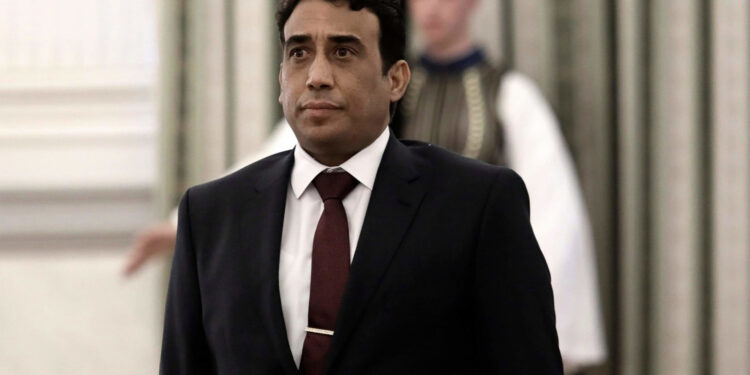The President of the Libyan Presidential Council, Mohammed Al -Mennaf, called for a unified budget for the country subject to oversight and justice, announcing the council to audit and international review of the budget in coordination with the United Nations.
This came in a statement by the President of the Libyan Presidential Council, Mohamed Al -Menafi, published on Saturday on Facebook.
“The decentralization and peace are the stability and the foundations for development and positive competition,” said al -Munafi.
He added, “The continuation of this impressive transformation requires the existence of a unified budget to ensure sustainability according to the dualism of justice and oversight based on planning, transparency, disclosure and accountability.”
“To achieve sustainability in light of the continued division of monitoring, accounting and international economic indicators or regarding transparency and disclosure, we have directed through close coordination with the United Nations and its institutions and friendly countries to the path of neutral international scrutiny and review at all budgets and institutions without exception.”
Two governments
Two governments are intended for legitimacy and power in the country, the first is the government of national unity headed by Abdel Hamid Al -Dubba, which is internationally recognized, based in the capital, Tripoli, where it runs the entire west of the country, and the second is the government of Osama Hammad, which was assigned by the House of Representatives more than three years ago, headed by Benghazi, runs the entire east of the country and cities in the south , And the two governments rely on double parallel spending, which exacerbated the country’s economic crisis.
At the beginning of 2024, the parties to the conflict decided to approve a unified budget for the entire country, and a committee was formed that included members of the House of Representatives and the state and a delegate of the central bank.
And that committee held several meetings inside the country to set a budget law, and held a similar meeting in Tunisia under American auspices, but that meeting failed after a dispute between the representatives of the two governments on the development item, especially since the two governments launched two years ago huge development projects called in the west of the country “the return of life And in its eastern “reconstruction.”
On July 14, 2024, the House of Representatives discussed during a session of the General Budget Law, and approved the unified public budget law of 179 billion Libyan dinars (about $ 25 billion).
The next day, the Supreme Council of State (as a second room for parliament) issued a statement declaring the rejection of the general budget approved by the House of Representatives for “its explicit constitutional violation, as well as the violations of it in form and content.”
The Council of State said, in its statement at the time, that “the approval of the Budget Parliament came in violation of the provisions of the Libyan political agreement, which requires the government – as the competent authority – to present the budget bill to the Supreme Council of State to express the obligatory opinion in it, and then refer it to the House of Representatives to discuss and approve it “.
Since that time, “parallel spending” has been placed from each government outside the framework of the official budget, amid attempts by the United Nations Mission to Manage Conflict Parties to reach a unified budget.
In addition, the UN mission runs other attempts to deliver the country to presidential and parliamentary elections that renew the legitimacy of all Libyan institutions and solve the crisis of the conflict between the two governments.



